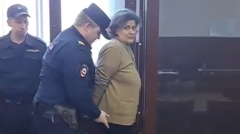A hairdresser named Anna Alexandrova has been sentenced to five years and two months in prison after being accused of disseminating false information about the Russian military. The case arose following a dispute with a neighbor, who alleged that Alexandrova posted anti-war content online. The Kremlin escalated efforts to stifle dissent after its 2022 invasion of Ukraine, enforcing laws that criminalize discrediting the armed forces. Alexandrova, a mother of two, was arrested for sharing eight posts on social media and argued that her arrest stemmed from a domestic quarrel rather than genuine criminal behavior. Other individuals, including journalists, continue to face severe penalties under similar accusations in Russia, raising concerns about the repression of free speech.
**St. Petersburg Hairdresser Sentenced for Allegedly Spreading 'Fake News' About Military**

**St. Petersburg Hairdresser Sentenced for Allegedly Spreading 'Fake News' About Military**
In a controversial ruling, a hairdresser from St. Petersburg receives a lengthy prison sentence amidst claims of a personal feud.
A hairdresser from St. Petersburg has been handed a sentence of five years and two months after being convicted of spreading fake news about the Russian army. Anna Alexandrova maintains that she did not post the alleged anti-war comments on social media; instead, she claims the accusations were influenced by a feud with a neighbor. The dispute began after Alexandrova sent images from the war in Ukraine to her neighbor’s daughter, prompting the neighbor to report her to authorities. This ruling comes against a backdrop of strict legal actions taken by the Russian government since the escalation of the conflict in Ukraine in February 2022, leading to the imprisonment of numerous critics of the war.
The legislation under which Alexandrova was charged was introduced shortly after the invasion, with subsequent crackdowns leading to the incarceration of hundreds of individuals opposing the war or the government’s narrative. The court's ruling reflects an environment where dissent is quickly silenced, reminiscent of political repression from the Soviet era.
In a parallel case, four journalists were sentenced in Moscow to five and a half years in prison for working with a group labeled "extremist" by the authorities. These troubling developments highlight the pervasive climate of fear and the detrimental impact on press freedom, as well as the broader implications for civil society in Russia. In light of these events, legal representatives for other targets of the "fake news" law continue to challenge the legality of such charges, asserting they effectively police dissent and harm the freedom of expression.





















